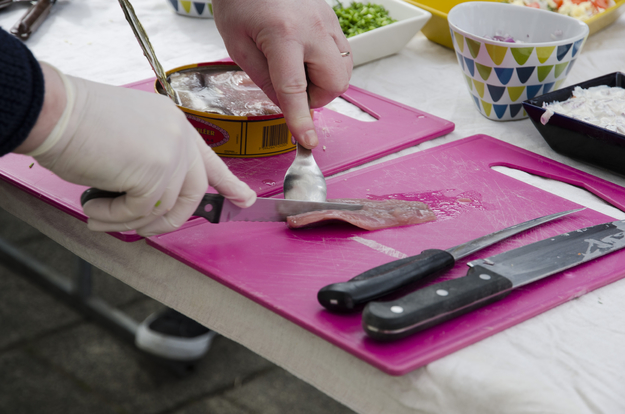Surströmming, Swedish for “soured fish”, is a northern Swedish delicacy made from the small herring, caught in the Baltic Sea during spring. These tiny fish are salted, fermented and packed into tins. The fermentation process continues well after being packed, often causing the tins to have a noticeable bulge.
This may sound innocent, maybe even appealing to tinned-fish connoisseurs. After all, fermented fish is really not so uncommon, as many coastal cultures have some version in their cuisine. Surströmming, however, is notably distinct. Widely regarded as the "world's smelliest food", surströmming's stench is most accurately described as a pungent concoction of rotten eggs, rancid butter and vinegar. The odor, most often, turns the initially curious off to the idea of tasting. The gutsy few that have gone through with the Swedish tradition, though, will testify that the taste is much less intrusive than the smell.
While the pungent fish is very often associated with the YouTube craze of surströmming vomit challenges, dozens of Swedish recipe blogs will argue that these videos do not demonstrate the proper consumption of the traditional dish. It is not common practice to consume the delicacy straight from the tin. Even diehard surströmming aficionados would agree that this barbaric feasting trend, demonstrated mostly by non-Swedish amateurs, is an act of pure masochism.
Instead, surströmming is typically served on top of a paper-thin Swedish bread, called tunnbröd. A bed of mandelpotatis (almond-shaped Swedish potatoes), butter, onion, dill and chives usually accompany the fish in a wrap like sandwich. The combination of these ingredients amply cut the intense flavors of the soured herring. Aquavit (a Swedish liquor) or beer is typically served alongside the dish to further wash down the strong flavors.
Now, for the those brave souls interested in trying the putrid delicacy, take a few precautions. If you're still not convinced that surströmming is really that big of a deal, the strict regulations involving the fish will surely convince you otherwise. First and foremost, surströmming must be consumed outdoors. Not only will your neighbors hate you if you opened a can in your apartment building, but it is actually illegal to do so. You don’t want the fire department interrupting your delectable dinner, do you?
Banned from the E.U. for containing a higher dioxin content than permitted, the tinned fish is harder to come by than you may expect. You won't simply find this product at your local supermarket. It is only legally sold in Swedish supermarkets for a few weeks per year in August. This small exception granted by the E.U. was implemented to preserve this treasure of Swedish cultural history.
Even if you are lucky enough to snag a can of surströmming, don't think about bringing it on your flight home. Surströmming is offically banned from a number of airlines due to the risk of the tin can exploding under pressure.

Recently, the Swedish tradition was brought to Amsterdam for a surströmming tasting, held at Mediamatic's own Zuur Market. In an almost performative manner, Bert Mulder, whom learned of the Swedish dish after living in Sweden for many years, applied surgical grade latex gloves and opened the tin can for a large crowd.
Within seconds of the first crack in the can, curious on-lookers cringed as they backed away from the booth. By the time the can was fully opened, only a brave few were left within the downwind. Despite the initial reaction, many people tried it but only after it had aired out a bit. Most only needed to hear that they'd be among the very few people in the world to have ever eaten it.

